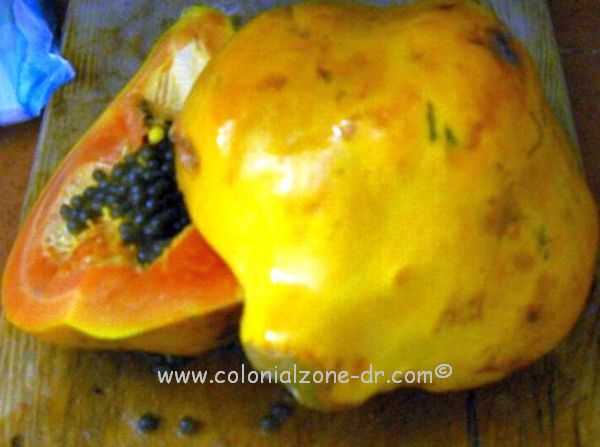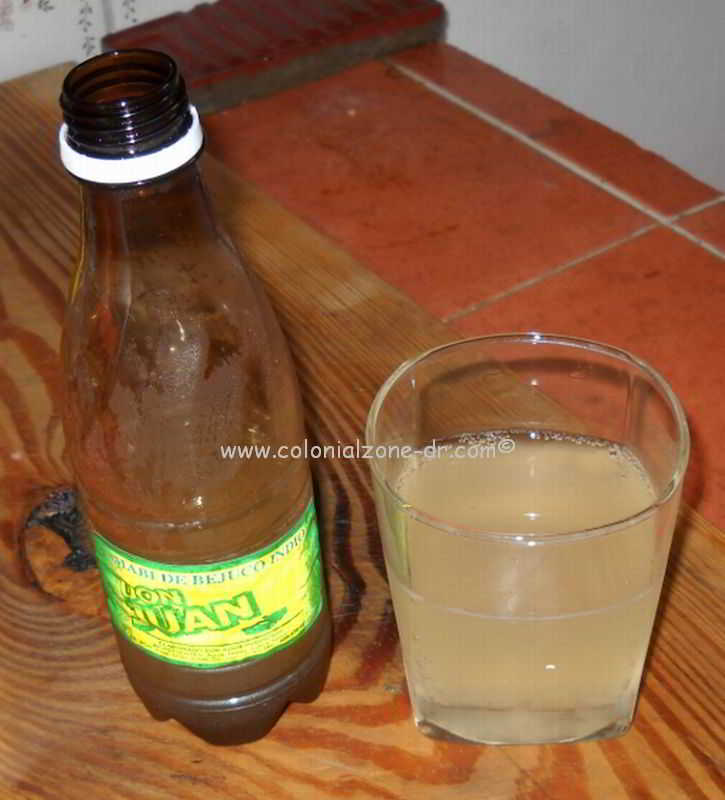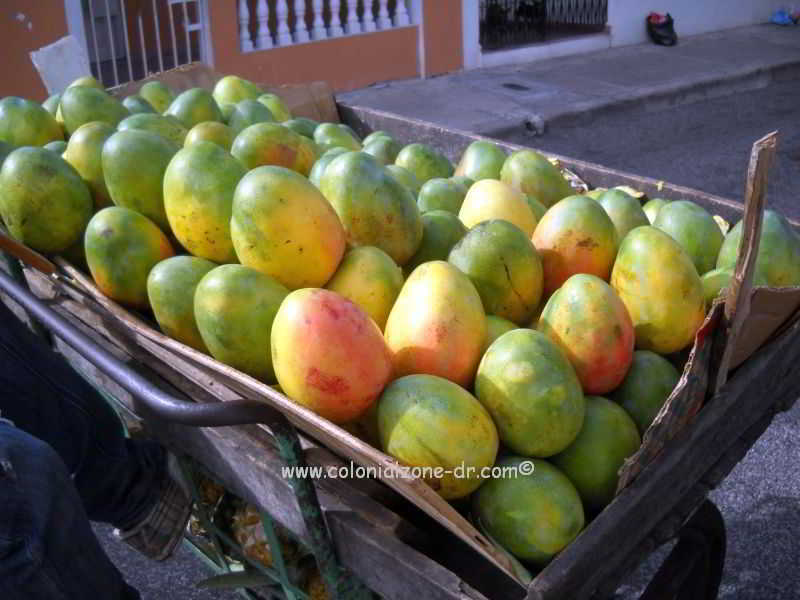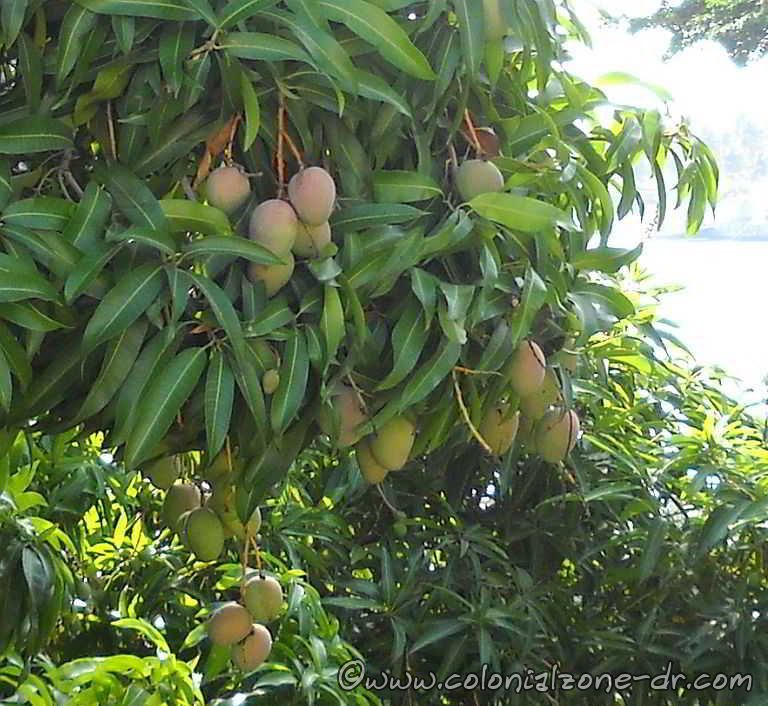Grown In Dominican Republic Page 1
Some of the many fruits and vegetables that grow in the Dominican Republic and their descriptions. Try a ripe yellow banana, a sweet, juicy pineapple or a tree-ripened mango. All are just too wonderful.
Lechosa/Papaya | Mavi | Aguacate/Avocado | Guineo/Banana | Piña/Pineapple | Mango
Lechosa/Papaya

Lechosa / Papaya is a fruit grown on large trees in tropical climates. There are male and female trees and their offspring are the sweet fruit papaya. Here in the Dominican Republic it is called lechosa.

It is a large fruit green when unripe. When the fruit is ripe and ready for eating it is soft and yellow with some darker spots here and there. It is best eaten plain and is quite juicy. One of the best ways to serve it is to blend it with some milk or carnation and ice. It is called Batida de Lechosa. This is really tasty. The little black seeds inside are sometimes eaten, they have a little of a spicy taste. They are used as a substitute for pepper when dried and ground.
Mavi

Mavi also spelled Mabi (pronounced Ma-Vee or sometimes Ma-Bee), is a staple in the Caribbean. This drink is made from the bark of the Mabi tree is also known as mabetree, soldierwood or seaside buckthorn. This bark is rich in glucosides (what is that you may ask? Wikipedia definition here) The bark is removed from the tree and boiled to make a tea. Sugar, usually raw or turbinado sugar is best as it has a little hint of molasses flavor to it. Many make this tea into the fermented drink by adding some yeast and letting it sit for a few days uncovered. It can also be made into a non-fermented drink as well. It is said to lower blood pressure, reduce cholesterol, and to make men more potent.
In Dominican Republic Mabi de Bejuco Indio is usually made locally and can be purchased in the Colmados and corner markets. It can be found in almost any type of bottle as the maker uses what is available. It is very refreshing and can be sometimes potent so beware.
Aguacate/Avocado

The Avocado of Dominican Republic has a variety of types and flavors. It is one of our most imported fruits. We import both organic and non-organic versions of the fruit.
Some avocados are dry and not as sweet and others have a much different taste than the ones on the grocery shelves that most people are accustomed to eating. When this creamy, nutty-flavored fruit (yes it is a fruit, not a vegetable) is in season it can be found in abundance in every market, on the streets and in most restaurants at a very reasonable price.

Dominicans use this beautiful green colored fruit on salads or just eaten plain with a little límon/ lime-lemon to accompany any meal, soup or stew. Make a sandwich using this fruit on some pan de agua and you will be quite pleased. Aguacate is also used in many cosmetic preparations. Just remember, it is fattening (about 75% of an avocado’s calories come from fat) so don’t over indulge. Avocados have more potassium than bananas, have the highest fiber content of any fruit and are rich in B, E and K vitamins. They are also known to lower the bad cholesterol and help with the good HDL levels.
Guineo/Banana

Guineo / Banana (the sweet type of fruit you can eat raw) – Platano/ Plantain (the hard fruit that is very starchy and needs to be cooked) are some of the most recognizable fruits of the world.

Here in Dominican Republic we love our bananas. They can be purchased in almost every corner store (Colmado) and in the streets. A sweet banana is a very nice fruit to refresh yourself and get some of the sugar your body might need on a hot day.

These large, big leaved plants can produce many fruits. They taste better here in the Dominican Republic because they are ripened right on the plant and not picked green like the ones shipped to other destinations. Choose a red, yellow or green banana/ guineo that can be eaten without cooking. Try a green to yellow platano that needs to be cooked to be eaten either plain or served in many imaginative forms. A fresh sweet yellow banana, nothing tastes or smells better.

For platano cooking information check out our recipes page.
Piña/Pineapple

The pineapple, simply called piña here, can be found growing in Dominican Republic. The ones sold in the streets here are usually vine ripened. This makes the piña taste so much better than ones you get outside of the country.

They can be purchased in almost any spot in the country, especially when they are in season. Vendors always have them either whole or cut for you to enjoy right on the spot. Some vendors cut them in a spiral way that you can hold like a lollypop. Do not be afraid to eat the core as it is soft and sweet just like the outside fruit.

Mango

The Mango is a well-known fruit that grows on a tall tree. The tree makes lots of fruits that are very sweet and juicy. There are many different varieties of mangos grown in DR.

The mango makes for some messy eating and it is well worth the mess. I suggest eating it with a knife instead of just biting into the fruit. This way you get all the juice in your mouth and not down the arm. Also, the pulp is very stringy and if you don’t have dental floss or a toothpick handy you will be digging at your teeth all day trying to remove the little fibers from between and this can get annoying. Another way to enjoy an overly ripe mango is biting through the skin and just sucking out the juice. It may sound strange but you should try it. It is very satisfying.

Mango fruits are wonderful and refreshing so please do not pass them up. They make a wonderful Batida (blended frozen drink) with some ice, milk or carnation, and a little sugar in a blender. I love to freeze this milkshake type drink for a freshening icy treat.
